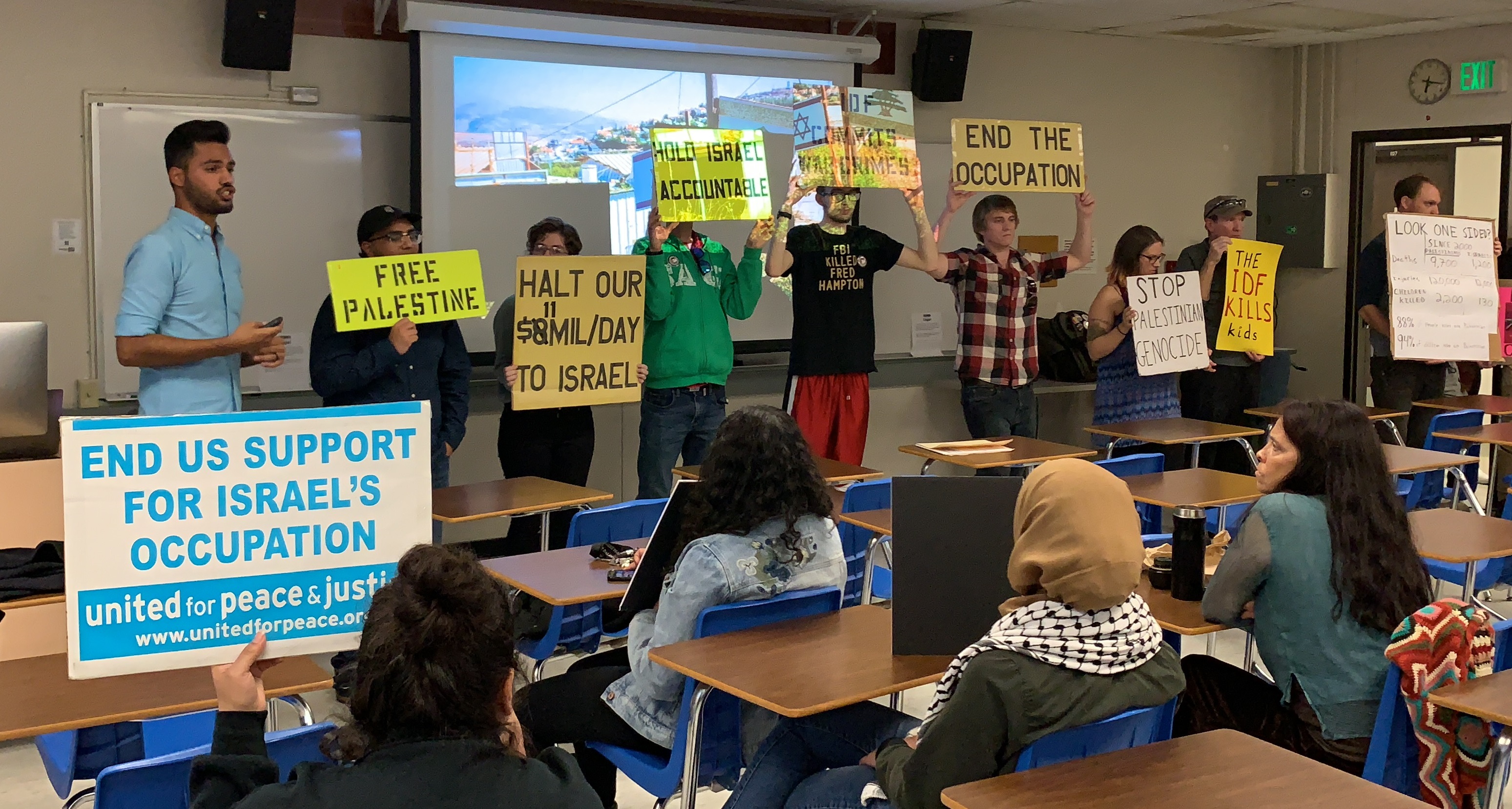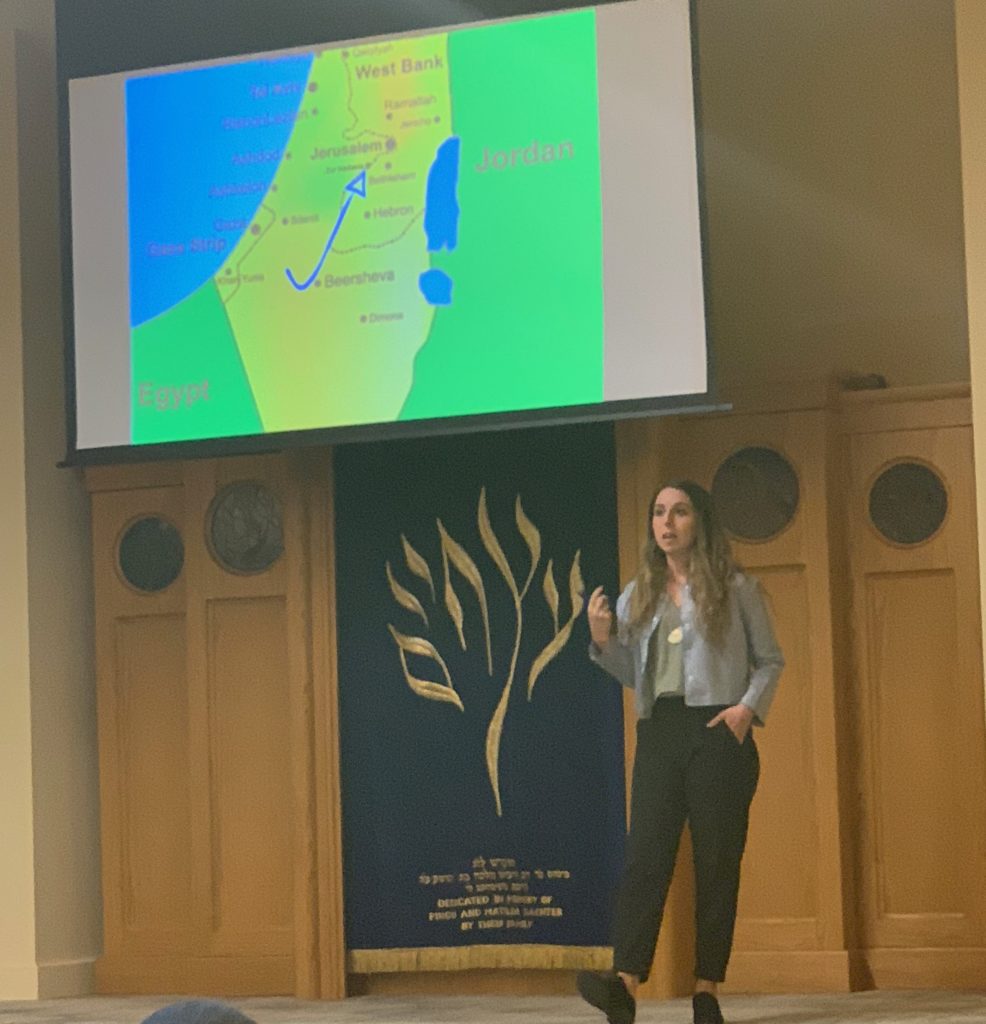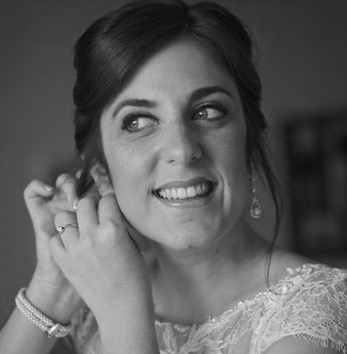 Courtesy of StandWithUs
Courtesy of StandWithUs This is the 11th year of one of my personal favorite projects to battle bigotry and modern-day anti-Semitism – the “Israeli Soldiers Tour. ”This project is one of the most significant counter-attacks of the notorious “Israeli Apartheid Week,” where false information about Israel is being spread by haters across North America college campuses.
In this tour, organized by the pro-Israeli nonprofit organization, StandWithUs, 14 reserve duty Israeli soldier-students travel the United States and speak on campuses, high schools, synagogues, churches, etc. They recount their personal experiences of serving in the Israeli Defense Forces (IDF) upholding its strict moral code while fighting an enemy that hides behind its civilians.
They also present their backgrounds, life in Israel and answer questions. “Israeli Soldiers Tour,” puts a human face to the IDF uniform, and by doing so, trying to combat the demonization of Israel and Israelis led by anti-Israeli movements, such as the BDS (Boycott, Divestment, Sanctions.) Their in-front-of-the-lines-and-behind-the-headlines stories, which have never been heard before, try to depict the more accurate, more balanced, reality in Israel.
Two of the participants of this year’s tour, Chen and Omri, agreed to let us in this emotional, exciting, life-changing experience, and answer some questions:
Chen, 24, was born and raised in Jerusalem to a family of longtime Jerusalemites. Her family fled anti-Semitism, one side in the 15th century during the Spanish Inquisition, and the other from Yemen.
After high school, Chen participated in a pre-military program where she volunteered with at-risk youth in Sderot, a city along the Gaza border. During Operation Pillar of Defense, Chen decided to stay under the threat of rocket fire to help the youth both mentally and physically. She served as a Navigation Instructor in the IDF, responsible for teaching soldiers to read maps and navigate in the field. Today, Chen studies Political Science and Israel Studies at the Ben Gurion University of the Negev.
Omri is 28 years old. His mother is of Eastern European descent and his father’s family is from Buenos Aires, Argentina. Omri grew up in central Israel in the town of Rishon LeZion. He now lives in Beer Sheva and studies Computer Engineering at Ben Gurion University of the Negev.
At 18, Omri began a 6-year stint in the Israeli Air Force as a pilot cadet, and he later transferred to “Yahalom” a special combat engineering unit, as a bomb technician. While in the IDF he participated and commanded missions in the West Bank, the Gaza Strip, and on the northern border, defusing missiles, explosive belts, and booby traps.
Following his military service he enrolled at the Ein-Prat Beit Midrash, an intensive Jewish learning programs for secular and religious Israelis in their twenties. After completing his studies Omri traveled around Central and South America.
Q: What is Israel to you, and how do you pass this message to students abroad?
Chen: Despite of all its inner conflicts, at the end of the day, it’s the most united place for me. Israel is the only place in the world that I can truly call home.
I grew up in a house with Israel deeply embedded in our roots because my family lived here for many generations before the country was even established.
It was important to me that audiences understand that deep connection, and the relations among the people and what brings us all together as a nation.
Omri: Israel is the most normal-crazy place on earth.
On the one hand, we live our daily lives just like the American people: studying, working and focusing on having fun. On the other, we put our life on hold for 3 years after high school in order to protect our borders by enlisting in the army.
I think I’m passing this message by just being me. I’m trying to show that Israel is not just a headline you see in the media. It’s a real place with real people and real stories. When students see that I dress like them, watch Netflix like them, but I served in the army and dealt with bombs and some dangerous stuff. they get the message.
Q: Walk us through the Israeli Soldiers Tour – how do you prepare? What does the tour look like?
Omri: The SWU (StandWithUs) Israel crew helped us develop our speeches, explained how to respond to friendly and hostile questions and how to properly approach Americans – they’re a bit different from Israelis, you know.
Our daily routine was 2-3 events a day in different locations. We told our stories about Israel and IDF to whoever wants to listen – Jews, Christians, Muslims, high schools, colleges, universities, local communities, synagogues and churches. In our spare time we get acquainted with American culture. We travel the cities, eat American junk food and watch football.
I was very excited about the tour. The opportunity to meet a lot of new people and influence them seemed magical to me.

I was happy to visit USA for the first time and explore a lot of new cities and culture that till now I’ve only saw at the movies.
My expectations from the tour partly matched the tour itself. In the good scenario, I thought we are going to talk to people who never heard about Israel and in the bad case, heard lies about it.
I was surprised to see that we have a lot of events with only a Jewish crowd. After several conversations, I understood the relevance of those events. Jews who aren’t living in Israel experience life way differently than we do – it’s much harder to keep your Jewish identity abroad.
When we tell them about Israel, they sometime envy us and really start thinking about “Aliya” – it always comes up.
Israelis tend to take things for granted. The support of the Jewish people around the world, and the USA in particular, must not take for granted. The support we get from American Jews is vital for Israel thriving, from all aspects. There are also a lot of amazing programs in Israel that are being funded by our friends abroad.
To sum up, I understood the importance of that connection and I was glad that I could make it stronger.
Q: Share one of the most memorable moments from your recent tour.
Chen: We were protested at Oregon State University (OSU) by members of the BDS campaign. They entered the classroom with signs saying things such as, ‘End the Occupation’ and ‘Israel is committing genocide.’ They stood in front of the screen, blocking our PowerPoint presentations.

At first, we tried to talk to them, but they refused to move; eventually we decided to continue anyway. They heard our stories, and at the end, asked us all their questions. We really created a dialogue. The amazing thing was that it felt like they were actually listening, and although they objected to some of our answers, there were some things they were truly surprised to hear.
We could tell that they began to realize that there may be more to this than they believe and some things they didn’t know. It was really a memorable moment because it felt like we really made a difference, that we tried and succeeded in creating a dialogue and breaking many of the misconceptions they held.
Also, the rest of the audience thanked us for that dialogue and said they learned a lot. Jewish students relayed that after hearing us, they feel better equipped on how to deal with these campus groups.
Stanford University’s Jewish Voice for Peace (JVP) protesters weren’t there to listen. They completely disrespected us and were only there to call us liars and murderers. They laughed at us and kept interfering when we tried to answer their questions.
I think that everyone has the right to have their own opinion, but these people don’t know the first thing about the Israeli reality. As someone who grew up around Jerusalem and the West Bank, and lived next to the Gaza border for a year under threat of rockets, it’s absurd when JVP members try to tell me what my reality is.
They have no idea what Israel sometimes has to deal with, and the terrible terror that sometimes affects our life…and, they don’t even care. They see only one side and completely disregard the other, and that’s wrong.
Omri: Shabbat dinner. Friday night. Beit Chabad. Tuscaloosa, Alabama. Maya and I just told our experience in the army in a very intimate event – about 10 Jewish students from the local university.
We share about the Israeli-Palestine conflict from a personal point of view. We end by wishing for peace between the two people.
Right after we conclude, the Rabbi started singing…quietly…alone..
עוד יבוא שלום עלינו, עוד יבוא שלום עלינו, עוד יבוא שלום עלינו ועל כולם…
(One day, peace will come to us and to everyone)
Then, he raised his voice a bit, and the whole group joined in while banging on the table.
סאלאם, עלינו ועל כל העולם, סאלאם, סאלאם..
(Salam (peace in Arabic) upon us and for all of the world.)
The rhythm of that classic song shook my soul, it felt more relevant now than ever. Our message for peace was successfully delivered.
Q: Who are you aiming for? Who is the target audience you want to reach?
Omri: As I mentioned, I am aiming for anyone who wants to listen. I am aiming for people who want to challenge their thoughts – those who aren’t rigid in their ideas and want to hear a different opinions and different point of views.
Chen: It’s about reaching anyone who will listen. It doesn’t matter if they are Jews or not, if they are pro-or-anti-Israel, in between or just didn’t care that much.
It is important that they know that the media doesn’t necessarily provide all the information, or sometimes not even the truth, and that there is so much more to Israel than they may know.

Q: What are people still missing when looking at Israel from the outside?
Chen: One of the most important things is that Israel is more than just what they see or read regarding the conflict. It has such great culture, people, views, economy and so much more. Sometimes, people forget to look at it as any other modern country such as their own. Sadly, sometimes Israel must deal with a difficult reality – but that’s only part of what it is.
At the end of the day, I think that most people don’t necessarily know Israel’s reality in the conflict – they look at it from only one angle without realizing that there are always two sides to a story. Also, people tend to regard things as “black or white,” and the Israeli story has so many different layers. It’s much more complex than people sometimes think – one story or one fact can never really encapsulate everything.
Omri: They’re probably missing the whole picture.
It’s easy to choose a side and stick to it, especially when the press reporting from the borders twists the reality and fake news fill the social media like a swirling, out-of-control hurricane.
An outsider viewing Israel likely thinks that it is a war zone. But, they’re missing the fun parts – our beautiful beaches, amazing ancient cities and history, delicious food and incredible people!
Q: How can we contribute to the battle against modern antisemitism and Israel’s delegitimization?
Chen: We can battle against delegitimization through education. Once individuals have more knowledge, society will be better. Knowledge is power. Once people explore different sources of information than just what they see in the news, they will begin to see the other side and the complexity of the issues.
Omri: The first thing that you already did is to read this blog! Half way to go!
The most important thing is to be actively involved. Stand up and defend Israel, don’t let issues pass right you by.
Personally, I believe in education. Spread the truth about Israel, show the good and bad – we’re not perfect, but nor is anyone else. Deliver our realty as it is without any propaganda. When people know more and are less misinformed, they will fight antisemitism and delegitimization of Israel on their own.
And, you can always ask the StandWithUs team for programs and activities in the USA, Israel, Canada, the UK and Latin America. There’s a lot of good people there that deal with these issues on a daily base.
Q: How can you tell a tour was successful? What are your indicators?
Chen: Having so many people from different places and different ages – teens, collage students or community members – asking questions and being involved and interested in Israel. At the conclusions part of our talks, hearing their reactions and their thoughts about Israel, made me feel as if we really managed to reach them and that our stories touched them.
Omri: My main indicator is the people. After each event, we’re being approached by many people who want to thank us and ask us many personal questions. You can really feel the you’ve affected someone and that’s a wonderful feeling.
Q: This is now the 11th tour. Looking at the past 10 years, do you think the attempts to delegitimize Israel and the wave of modern-day antisemitism is decreasing?
Omri: This is my first tour, and my first encounter with the American people in America. So it’s hard for me to feel the difference.
That being said, I can feel the wind of change after each and every talk. I can feel the young students, that might never have spoken to an Israeli or even a Jewish person, enlightened by our meeting.
In my opinion, the roots of modern-day antisemitism is ignorance. There is no place for that in the 21th century. It’s a process, it might take time, but in the end, knowledge will overcome it.
Michael Dickson, Executive Director StandWithUs- Israel:
“There is no silver bullet for Antisemitism – we expect it to continue. What is important is that we are constantly aware of how the threat metamorphoses. The attempts to delegitimize the world’s only Jewish country remain and they morph into anti-Semitism.
The ‘Israeli Soldiers Tour’ was created years ago by students in our Fellowship program incensed by the lies being told about the IDF and asked us to confront it. It continues to grow and the impact the multitude of speaking engagements and interactions these Israeli young adults have – in addition to their online following – is at its peak. One of the best antidotes to BDS is for people to interact with Israelis – in many cases it is the first time they ever met one – and realize they are just like them.”























 More news and opinions than at a Shabbat dinner, right in your inbox.
More news and opinions than at a Shabbat dinner, right in your inbox.